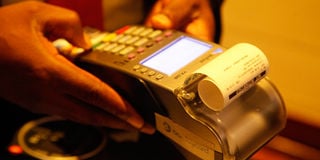Prime
Fintechs must open up to shared solutions - players

We are already witnessing collaborations and partnerships around fintech and communication, which are lowering the cost of money transactions. FILE PHOTO| NATION
Financial inclusion is one high flying discussion that continues to dominate boardrooms.
It is a conversation that needs serious engagement to understand what financial institutions and service providers must offer beyond just extending financial access.
First and foremost, financial technology companies (Fintechs) need to seek universal inclusion in an increasingly technology driven market by creating solutions that aggregate and converge services into a single platform.
Indeed, the need has never been urgent than now after Covid-19 has disrupted the conversional way of doing things.
During the 40-Days-40-Fintechs Initiative, just last week, which attracted more than 40 Fintechs, it was apparent that there is need to unlock the financial inclusion space from the current format of scattered services to a single shared platform.
In all this, the argument is, services must have understandable interfaces and must be able to easily work with other products or systems.
This is already being done by some innovations such as Mojaloop, an open-source software for financial services companies and government regulators, but more is needed.
It is important that barriers, which continue to hinder resourceful financial services, are broken.
Innocent Kawooya, a digital financial inclusion advocate, says that whereas it is important to celebrate innovators that enable financial inclusion, there is need to appreciate in a special way those that are actively breaking digital barriers.
Breakdown barriers, Ronald Azairwe, the Pegasus Technology managing director, thinks is long overdue and is the only way through which financial institutions can collaborate with larger networks.
Financial inclusion, he say, will in future go beyond the concept of access to involve marriages of different services.
However, beyond this, according to Eric Kamau, the True African founder and managing director, breaking barriers must address issues of cost, adoption and education, among others that are in themselves barriers.
Until the late 2000s, financial inclusion had been a problem. However, the advent of the mobile phones has made it easy and offered space for more innovations.
Many of the innovations have enabled Ugandans to access financial services outside the traditional banking system.
A 2018 FinScope survey indicates that in Uganda, just only 11 per cent of adults, use banking services. Of these, 9 per cent had accounts while 2 per cent did not.
Therefore, the reports notes, the biggest percentage of Ugandans rely on non-traditional banking solutions to access financial services.
This is where shared solutions, such as Mojaloop, must focus and aggregate digital financial services into spaces that are easy to use and understand.
Safety
According to John Baptist Ochieng, the Craft Silicon Uganda team leader, while shared solutions are great innovations, special focus must be put on inclusivity and safety.
However, Kawooya, argues open source technologies are safe because they build blocks in form of back-end technologies and software engineering layers.
Mojaloop, which seeks to advance shared platforms and inclusivity, especially among the unbanked, was originally developed by ModusBox with funding from Bill & Melinda Gates Foundation in 2017.




